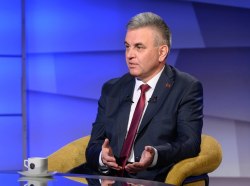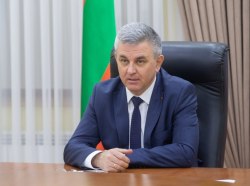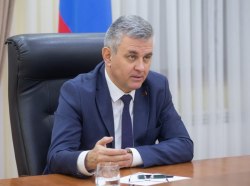TASS:
Kishinev announced after the EU’s decision to begin negotiations on the inclusion of Moldova, that it was ready to join without Pridnestrovie. They noted at the same time, that they are not abandoning these territories. What is Tiraspol's position on this issue? How do you see the coexistence of the two banks of the Dniester in conditions when more and more European legislation will apply to the right bank?
The PMR President Vadim Krasnoselsky:
It is important to understand that the root of the current problems in Moldovan-Pridnestrovian relations does not lie in the norms of European legislation or even in the European integration of Moldova. Addressing its leadership, I have already given the example of DCFTA, when the Republic of Moldova, within the framework of its association with the European Union, concluded an agreement on a free trade zone. The European representatives and I were able during bilateral negotiations to find a mutually acceptable formula for continuing trade. However, Moldova has been striving in various ways to limit the export-import relations of Pridnestrovie over the years, creating problems for European consumers of our products even in the new conditions.
The blockade measures of past years, the introduction of duties for our economic agents from the 1st of January of this year – all this is a targeted policy of the Moldovan authorities. The “European choice” has absolutely nothing to do with it. On the contrary, the leaders of Moldova once again show that all their talk about European values is just an empty phrase with these unfounded restrictions, which, among other things, violate the agreement between Pridnestrovie and the European Union on the trade regime.
Nothing prevents the Moldovan side from returning to the negotiating table right now and lifting restrictions on people and businesses. I am deeply convinced that the scenario in which good neighborly relations exist between Pridnestrovie and Moldova is the most profitable and viable of all. It can be implemented even in the conditions of the notorious European integration. The Moldovan authorities are leading our relations only towards greater confrontation so far.
As for the statements about Moldova joining the European Union without the territory of Pridnestrovie... I would call this a realistic approach. We are a particular subject of international relations. Neither the EU nor Moldova can decide for us. Therefore, if a neighboring country wants to join somewhere, then go ahead, and we ourselves determine our own destiny.
TASS:
Ukraine closed its border with Pridnestrovie last year. Moldova has tightened the passage of your goods through its territory on the other hand. Kishinev announced the introduction of duties on goods bound for Pridnestrovie. How will these restrictions affect economic stability in Pridnestrovie?
The PMR President Vadim Krasnoselsky:
The requirement of customs payments from economic entities of Pridnestrovie is a fundamentally new problem in the settlement process. Pridnestrovian enterprises have never in history contributed customs duties to the budget of Moldova. We have still not received any explanations either from the Moldovan government or from the representative on political issues.
There is a gross violation of the agreements of the negotiation process, the principles of goodwill enshrined in it, consistency in dialogue and the inadmissibility of unilateral measures that worsen the situation of one of the parties. Pridnestrovie was not notified in advance about plans to request new payments to the budget of the Republic of Moldova, Kishinev and intermediaries, including the OSCE Mission, assured through various channels that customs duties would not be collected from January 1, 2024 on the contrary.
It is currently impossible to accurately estimate the amount of damage to Pridnestrovian enterprises from paying customs duties in Moldova, but it is obvious that we are talking about tens of millions of dollars a year. This will mainly affect the prices of imported goods, causing inflationary pressure and a decrease in purchasing power. This of course will be followed by a reaction from society and the state. Pridnestrovie has been calling on Kishinev for dialogue for many years, trying to avoid tension and economic war, but Moldova is persistently following the path of escalation. It is Moldova who bears the responsibility for further inevitable consequences.
TASS:
Moldova has begun to denounce agreements concluded within the CIS. It was reported that at the first stage Kishinev plans to abandon a third of the concluded agreements, however, voices are already being heard in parliament about the need to withdraw from the CIS. These agreements are used in Pridnestrovie. What effect will this decision have on you?
The PMR President Vadim Krasnoselsky:
The unjustified severance of relations with the CIS by the leadership of Moldova is an alarming factor. The negative consequences of the denunciation of significant agreements within the Commonwealth will be felt by the population of the Republic of Moldova for many years.
Pridnestrovie cannot influence the erroneous course of Kishinev and strives to build direct communication with CIS structures. We count on reciprocal steps. If we do not determine the special form of our relations with the CIS, then Moldova’s withdrawal from the existing agreements could lead to direct damage to Pridnestrovie in many areas. We constantly draw the attention of Russian representatives to the emerging reality. We and Russia have an extensive regulatory framework for bilateral cooperation in the field of economics, agriculture, finance, industry and trade, quality control of goods, education, science, culture, sports, there are at least 70 agreements in total, which we consider more than relevant. Their use can help avoid risks provoked by the short-sighted policies of the Moldovan leadership.
Pridnestrovie at the same time is invariably ready to participate in the work of the Commonwealth, including both the existing treaty base and dialogue formats. It is obvious that we will come to this sooner or later.
TASS:
There is information that a number of enterprises in Pridnestrovie were forced to reduce production or stop due to gas shortages. What solution could there be for this problem?
The PMR President Vadim Krasnoselsky:
Domestic gas consumption is increased currently due to the winter period. Therefore, the current level of gas imports in Pridnestrovie is barely enough for us to meet the needs of the population in fact, as well as to fulfill obligations under the contract with Moldova for the supply of electricity from MGRES. It is objectively difficult in such conditions to ensure the normal operation of enterprises, not to mention the development of their production. The optimal option would be to increase gas supplies to Pridnestrovie. Otherwise, we may have to think about changing the structure of domestic gas supply. At the same time, the priority will always be the interests of household consumers, of course.
This is far from the only problem unfortunately, that the Pridnestrovian industry is currently facing. An unprecedented challenge was Moldova’s blocking of exports of three leading engineering enterprises in Pridnestrovie due to the fact that their products allegedly may belong to dual-use goods. However, this is just an excuse to deal another blow to the economy and population of the republic. The range of goods supplied by these factories is traditional, and no questions had ever arisen about it until August last year. The fact that they are not used for military purposes is confirmed by the counterparties of our enterprises, including those in the EU.
The political background of these restrictions is obvious to everyone, but they still persist. International mediators have not shown adequate participation in solving this problem, unfortunately. Meanwhile, more than a thousand employees of the affected enterprises have been sent on forced leave, and production has been suspended. Work collectives that have been formed over many years are being disintegrated, highly qualified specialists for whom there is no replacement are leaving, and many families find themselves in a difficult life situation. This is a large complex of not only economic, but humanitarian problems. The restrictive measures of Moldova once again affected people whose rights were massively violated.
TASS:
The Moldovan authorities have increased the military budget and arms supplies to the country. The republic’s leadership calls for abandoning neutrality and joining NATO. Does Pridnestrovie see a threat to itself in the actions of Kishinev?
The PMR President Vadim Krasnoselsky:
When our neighbor, with whom there has been an unresolved conflict for more than thirty years and who has already treacherously attacked our peaceful cities in the past, suddenly rushes to arm himself, this is naturally a threat. Here's a simple but revealing fact: Moldova's military budget has doubled in just the last couple of years. This is despite the very problematic socio-economic situation in the neighboring country.
I can cite many more such eloquent figures and facts: military subsidies to Moldova through the European Peace Fund in 2021 - 2023 totaling 87 million euros, and 19 “Piranha” armored personnel carriers supplied to Germany last year for the Moldovan army, and dozens of joint exercises of military contingents of Moldova and NATO countries only for 2023. This list can be continued for a long time.
The militarization of Moldova is a factor that we have no right to ignore. Nothing is done for nothing, and money, equipment, weapons, air defense radars also go for a specific purpose in this case. What for? It is not for protection obviously. All international players and even the Western partners of the Republic of Moldova admit that Pridnestrovie does not pose a danger to this country. So why is it arming herself? Is that for defense? The Moldovan leadership does not give clear answers to these questions. But we already understand everything.
TASS:
Moldova and other participants in the “5+2” negotiating format spoke out previously about the impossibility of continuing work in this format until the end of the conflict in Ukraine. The mediators call on Moldova and Pridnestrovie to intensify negotiations at the bilateral level. We see that there are barriers here. What are the reasons for the stagnation of the negotiation process and what might be the solution to this situation?
The PMR President Vadim Krasnoselsky:
Stagnation in the negotiation process is the choice of the Republic of Moldova exclusively. There are no other reasons for a pause in the dialogue, paralysis of the “5+2” format and refusal of the agreements reached, including the “Berlin Plus” package. At certain stages, Kishinev’s destructive approach coincided with the logic of individual international participants, but the responsibility for breaking the mechanism in any case lies entirely with the Moldovan leadership.
Moldova acts today exclusively through the tools of sanctions, restrictions and intimidation. Blockade and restrictive measures in the economic sphere or the notorious amendments to criminal legislation that criminalize so-called separatism are only the most striking, but not the only examples. The representative for political affairs of the Republic of Moldova openly admits in an interview that the goals of the so-called reintegration are achieved not through dialogue, but through mechanisms of economic coercion.
It is obvious that with such a political worldview, Kishinev does not need a fair, competitive and open for international participation “5+2” format, which is obliged to take into account previously reached agreements and adhere to the agreed negotiation space because any minimally unbiased international examination will see the arbitrariness of the Moldovan side and massive violations of human rights.
It was Kishinev that provoked the stagnation of the “5+2” format, disrupting the Bratislava round in 2019, not showing up for negotiations in 2020 under the pretext of a pandemic, and in 2021 due to the dismissal of its political representative. Now The “fig leaf” for further sabotage of the dialogue on the part of Moldova is the Russian-Ukrainian conflict.
The parties including Moldova will have to sit down at the negotiating table sooner or later. It is not necessary that at that moment the circumstances will be more favorable for Kishinev than the current ones. Realizing the value of peace and dialogue requires political maturity and responsibility, common sense and sincerity. The current leadership of the Republic of Moldova, at least at the moment, does not show these qualities.
TASS:
Deputy Prime Minister and Foreign Minister of Moldova Nikolai Popescu said recently in a conversation with journalists that the current government does not have any special settlement plan, which were previously developed by its predecessors in other governments. Kishinev’s position is based on the decision of the 2005 parliament, according to him. However, we remember that this document only complicated negotiations on the political formula for the future relationship between Kishinev and Tiraspol. Can you comment on this approach?
The PMR President Vadim Krasnoselsky:
As we can see, Nikolai Popescu is quite an experienced diplomat, knowledgeable in international law. He understands well that the fundamental foundations of the statehood of Moldova, which was built by the method of legally excluding all legal consequences of the creation and existence of the MSSR, deprives de jure Moldova of the rights to any claims to Pridnestrovie. Every serious international lawyer will understand that the decisions of the highest legislature dated June 23, 1990 and the basic provisions of the Declaration of Independence of Moldova of August 27, 1991 are a fact of legal rejection not only of the entire Soviet past, but also of claims to the MASSR – historical Pridnestrovie.
Many Moldavian politicians, apparently due to insufficient legal education, pretend that they can recognize as illegitimate all the legal consequences of the creation of the MSSR, but at the same time seize its component part in the form of the territory of Pridnestrovie, and within the borders of the entire MSSR. This is obvious legal nonsense. It is very good that at least someone in the Moldovan leadership understands this fundamental problem. It is for this reason that any artificial formula for resolving relations between Moldova and Pridnestrovie, which does not take into account the already accomplished act of legal refusal of the Republic of Moldova from Pridnestrovie, will inevitably break down against this fundamental obstacle.
Mr. Popescu’s reference to the so-called 2005 law on the special legal status of Pridnestrovie looks like a banal tribute to political tradition in this sense. This was a desperate and erroneous unilateral step by Kishinev, condemned, by the way, by all international mediators. This act buried a number of substantive initiatives that were then on the negotiating table and made the further negotiation process based on the final settlement formula essentially meaningless.
But most importantly, the 2005 law does not have any legitimacy for Moldova even from a purely legal point of view since it directly contradicts the Declaration of Independence of the Republic of Moldova dated August 27, 1991, within the framework of which all branches and authorities of Moldova undertake to eliminate the political and legal consequences of the Pact Molotov-Ribbentrop, including the creation of the MSSR through the annexation of Bessarabia to the MASSR (Pridnestrovie). It would be on the contrary more appropriate to adopt a law in the Republic of Moldova on the inadmissibility of recreating the MSSR by re-unifying Moldova with Pridnestrovie as the legal successor of the MSSR, following the legal logic. As we see the Moldovan leadership demonstrates legal nihilism in this example, violating its own fundamental principles of statehood.
The Moldovan authorities unfortunately continue on the wrong path, refusing constructive dialogue with Pridnestrovie at all levels, provoking tension and increasing confrontation. This approach is completely counterproductive. The only thing it can lead to is a further deterioration of Moldovan-Pridnestrovian relations until complete rupture and escalation of the conflict. This is a road to nowhere, and the Moldovan authorities must be aware that this time the cost of their mistake may be much higher.








